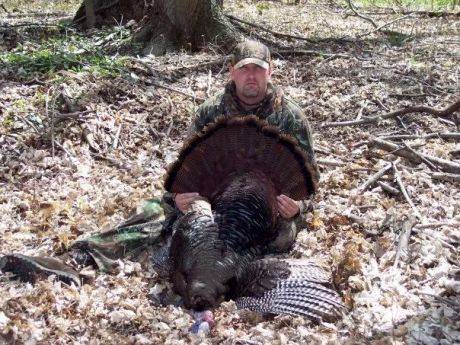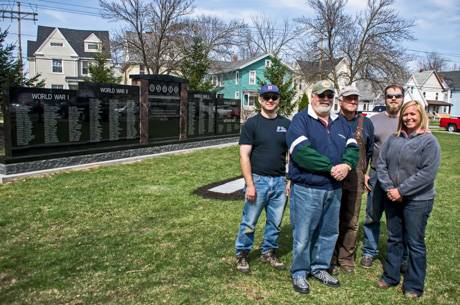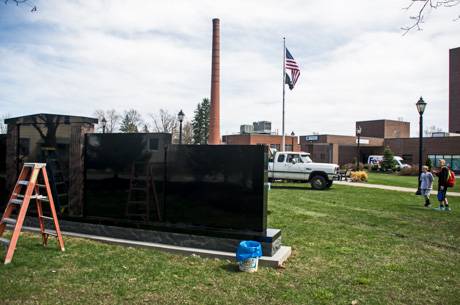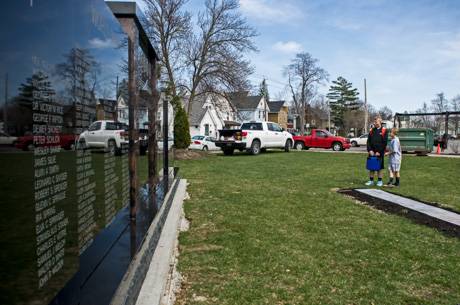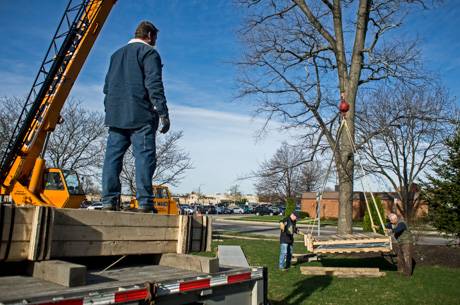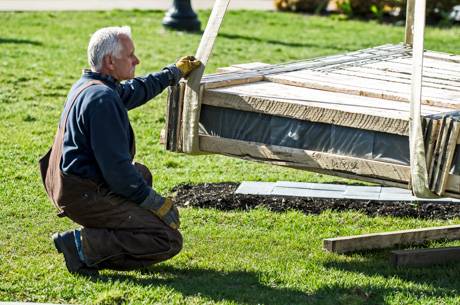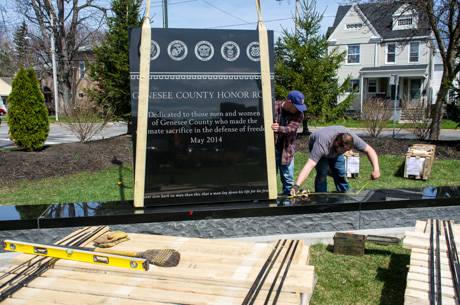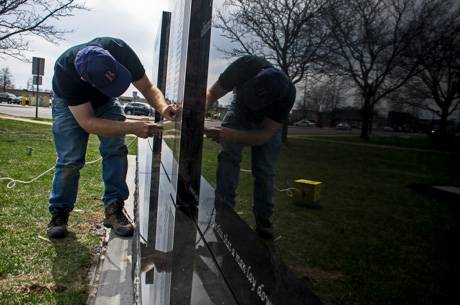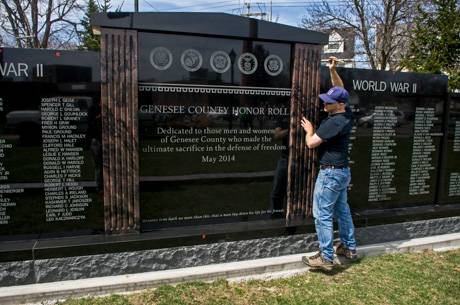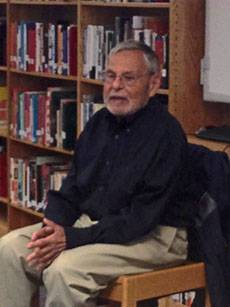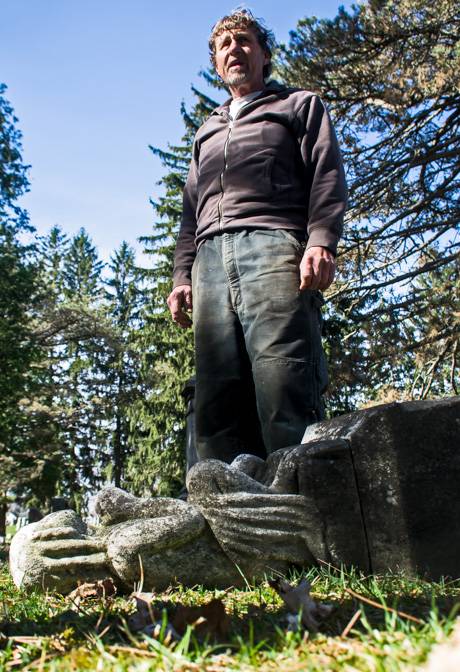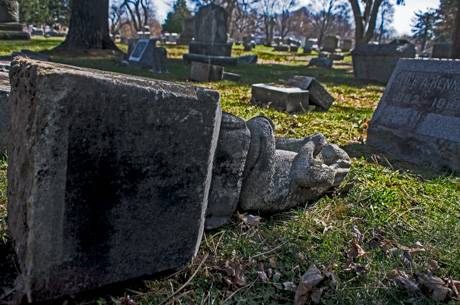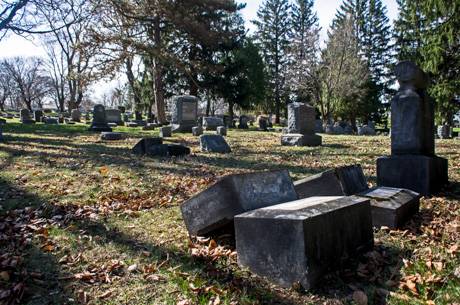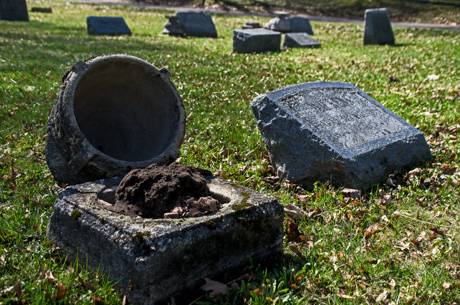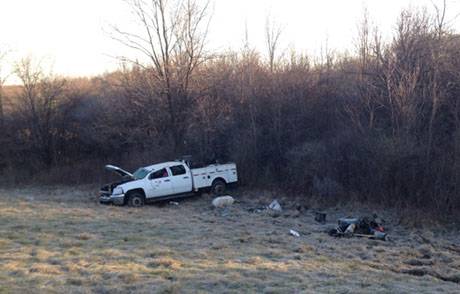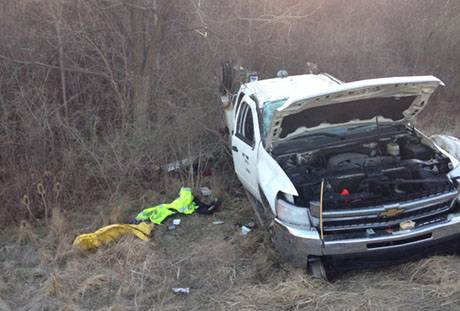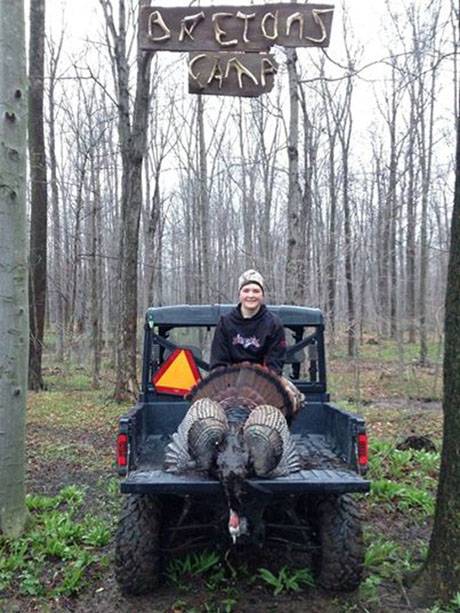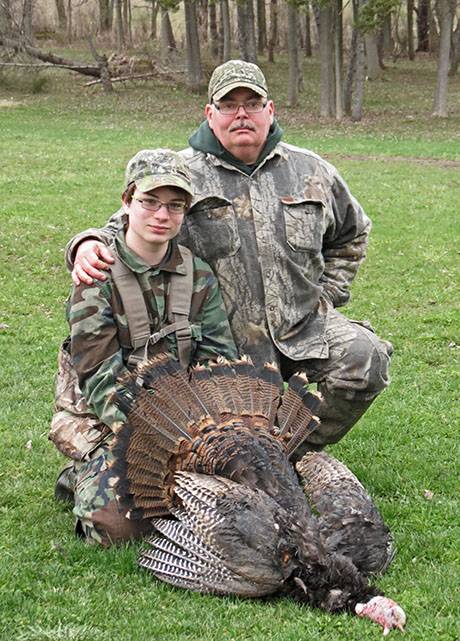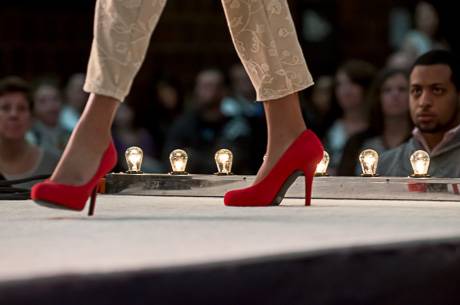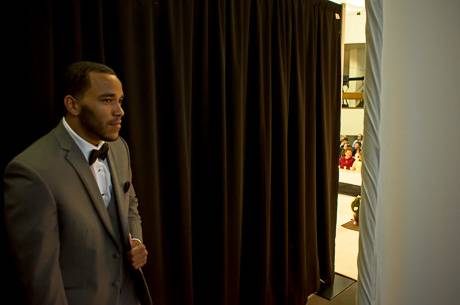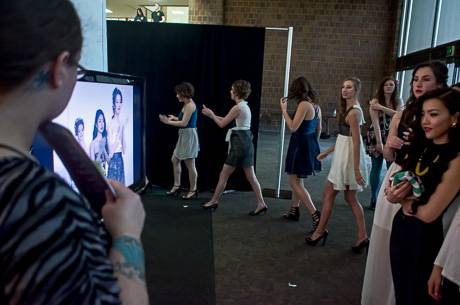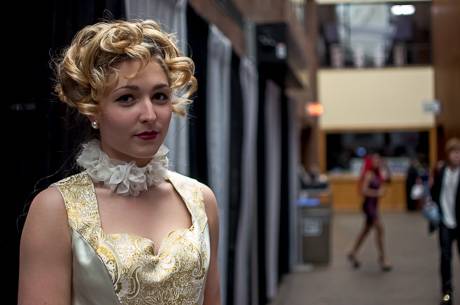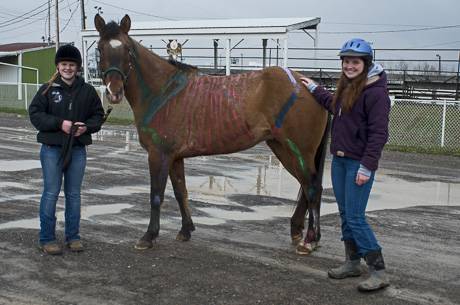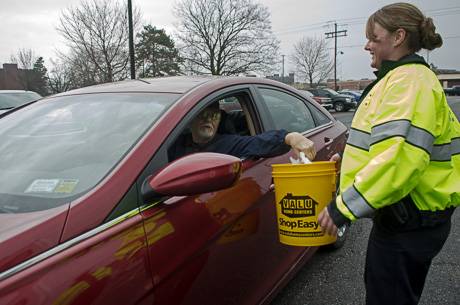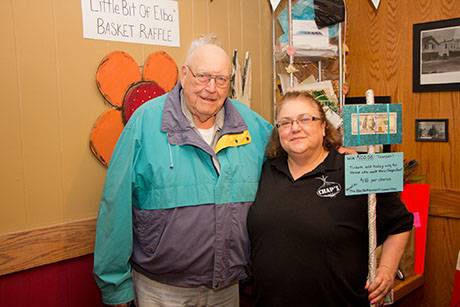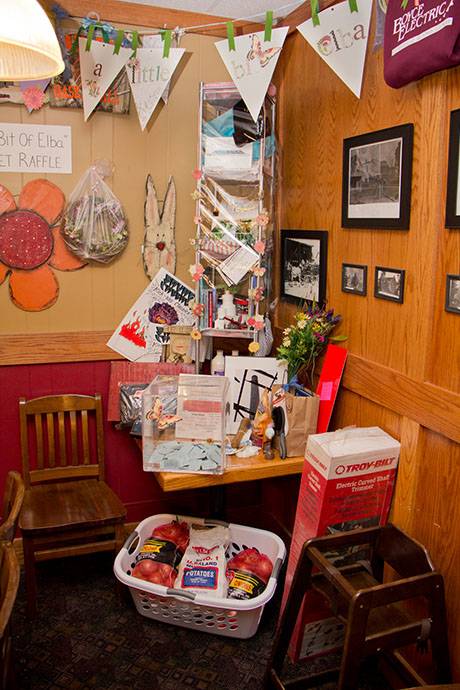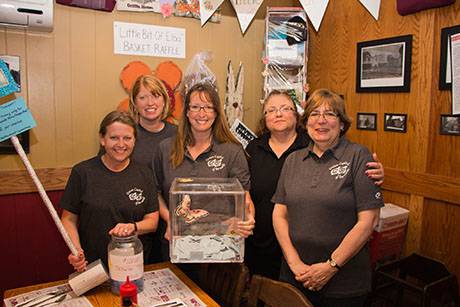If you will but listen to Henry Silberstern he will tell you his abominable memories. For 22 years, this 84-year-old Holocaust survivor has told countless students, dozens of groups, the media and others of his adolescence as a Nazi prisoner. He even has a book out (available on Amazon, aptly titled "Lost Childhood: A Memoir.")
And he will continue to speak out as long as he is able because he says it's something that younger generations need to hear -- and firsthand accounts are rare. Silberstern is keenly aware that time is running out; that he is among the few still alive to tell the God's honest truth.
That's what brought the Rochester resident to Batavia High School on Friday, at the invitation of Special Education teacher Kathryn Herniman. Two specially selected groups of about 30 students got to hear him in the library.
The bare outline of his bio is that he was born in a little town called Teplice, west of Prague in Czechoslovakia. Fearing an advancing German army, his Jewish parents moved to Prague. But, like many others, they misjudged the situation and in 1939 the Germans came and occupied the country, bringing with them their new rules and regulations for Jews. No cameras, radios, bicycles, shop only certain times on certain days, no use of public transportation, et al.
"The only place kids could play was the graveyard. Sounds a little gruesome, but you can play a lot of hide and seek there," he said with a chuckle.
Eventually, he would have to wear the humiliating yellow star sewn on his shirt, which prevented him from doing other things, too. He was forbidden to attend school at age 12, something that affected him for the rest of his life. That same year, he was sent off to a prison camp.
Children around his age were put in youth dorms, those for girls and those for boys. At his dorm, there were 30 boys living in each of the 10 rooms of a converted schoolhouse. They slept on three-tiered bunks.
The Germans relocated him and his mother and older brother and they wound up in Auschwitz-Birkenau in Southern Poland in the so-called family section with about 10,000 others.
In June of '44, the Germans decided to break up the section and they selected able-bodied men and women for labor camps. Silberstern's mother and brother were among the able-bodied. But three-quarters of the inhabitants did not qualify and were supposed to have been gassed and cremated by the end of July.
At literally the last minute of the disbursement, an order came to choose about 100 boys between ages 11 and 15, for reasons unknown, to go to a youth labor camp. Dr. Josef Mengele made the split-second selections, pointing left or right, live or die. Henry got to live and so did 88 others (not the 100 originally called for).
He then stayed in the neighboring men's camp until the early Fall of 1944 when he and five other boys were picked again to go to another camp in a complex which supplied labor to a nearby coal mine. From there, the six were shipped to Nordhausen (a sub-camp for Dora-Mittelbau, in turn a sub-camp for Buchenwald) where they toiled to help a manufacturer make the devasting bombs that killed a lot of Londoners.
Then Silberstern says he was sent further inside Germany to Bergen-Belsen, by far the worst camp he ever suffered. A Canadian contingency of the British Army freed him from that place when he was 15 -- in fact on his 15th birthday, April 15, 1945.
At this point, the visiting speaker told the Batavia High students that the most important thing now was to take advantage of what is almost certainly their only opportunity to ask a Holocaust survivor something directly.
"Please ask me anything you want and we'll take it from there," said the diminutive, somewhat hoarse Silberstern, seated before the group, and wearing tan pants, long-sleeved navy-blue Oxford shirt, brown leather deck shoes. He had a slight cough, which prompted him to dab a handkerchief on his lips from time to time.
During the post-lunch session, the first question asked was if he has a number.
"Why do you think I have a number?" Henry asked the girl.
"Because you were in the camp."
Silberstern answered that most people think every person who was in a concentration or labor camp had a number tattooed on the forearm. But actually, it was only those who were in the gigantic Auschwitz-Birkenau complex, which he thinks had about 69 sub-camps, who were distinguished in that way. And yes, he has his number tattooed on his forearm.
Next, a boy asked "What were your initial thoughts upon arriving at the first camp you went to?"
"A bit of confusion. I didn't understand why. But then again, I didn't understand a lot of the other whys either -- Why couldn't I keep my bike? Why couldn't I...so many other issues. There were no answers to it. It was always ' 'cause that's the orders.' ... I guess this seemed like just another order in the progression of things. You go from one bad thing to another, after awhile you say 'well, I guess that's the way it is.'
"And in a way that's exactly the way it happened. I never sat down and really questioned it. ... there were so many other kids in exactly the same situation that I was and this was a common thread amongst us. Unfortunately, for those things there were no answers."
"How hard was it to re-adapt to normal society after you were liberated?"
After a long pause, he replied "I'm not sure how long it took me, but I do know that it was extremely important. Other kids my age had the same problem. We were a certain age chronologically -- I was 15 at that point -- but street smart (-wise) I was more like 21. I learned how to steal, I learned how to cheat, and lie, and all those things. It was necessary to get along, to survive. ... And I was really a third age. When I was forbidden to go to school, my education stopped there, so I was about 12. ... I knew I had to make a decision...most of us realized it makes more sense to be what your chronological age is. We didn't come to that conclusion overnight, but we realized that you have to pick one and stick with it."
Question by Ms. Herniman: "Talk about how food helped you get through it (as he had explained to the prior group of students).
"We were always hungry. Constantly hungry. And I've never yet come up with a way to explain it -- what it means to be really hungry. I'm sure there were occasions when you thought you were hungry -- maybe you didn't feel well and you didn't eat for two days -- but that's not being hungry. And I found out that being thirsty is worse than being hungry."
To help them grasp what he meant, Silberstern told them about a typical daily menu. In the morning, a prisoner was given a cup or bowl (whichever the prisoner had) of a lukewarm, cloudy, muddy-looking liquid. He was told it was made from grain, but for some reason he says he never believed that. He doesn't know what the gruel was made from. At noon, all the camps serve soup. It was usually made from potato peels (the guards got the actual potatoes) and often they threw in a vegetable, most times a turnip. At night, they each got a piece of bread, maybe with a pat of margarine or a spoonful of beet jam. That's all.
The unending sense of hunger, Henry explained, could drive people to do things that under normal circumstances they wouldn't even dream of doing. A father would steal food from his son. A mother from daughter.
Getting more food was practically impossible.
"I remember one occasion, I was working at the railroad siding, when a new transport of prisoners was arriving. And many of the people, particularly in 1944 when they brought in the Hungarian prisoners, they brought in suitcases full of salamis and stuff that you couldn't bring into camp. But we sure did gorge ourselves at the railroad siding. ...food was a bargaining chip, food and cigarettes.
"I think as many people died from the effects of starvation as they did from whatever other causes there were -- brutality, and so on. So being hungry was a constant part of your life. Even when you worked outside the camp, in a field for example, if you stole a potato, when you got back to camp, they found it, they took it away from you, you got punished.
"I've eaten my share of raw potatoes. That's not exactly something you look forward to, they taste pretty bad. But you do what you have to do. ... People ate grass if they could ... nothing was off limits, so to speak."
"Did you travel in cattle cars?"
"Yes, I've traveled in cattle cars. Most of these rides were very unpleasant. One was the winter of 1944-45 -- one of the most severe winters in Europe. I traveled from Nordhausen to Bergen-Belsen. We were put in open cattle cars and the cold was really brutal. Of the 100 people shoved into (each one), maybe only 30 percent arrived alive. Even in closed cattle cars, you might not be as open to the elements, but there were other reasons they were unpleasant. Not just the crowding. Prisoners were in pretty bad shape and were driven to do some pretty nasty things to each other."
"What is your worst, most horrific memory?"
"I'm not sure if it's the worst I've seen, but it's the most vivid. It left an impression on me that I find very hard to forget. That occurred when prisoners were beaten. They constructed a bench and when a prisoner was slated to be beaten, he had to put his feet in this box at the bottom of the bench so that he couldn't back out. Then two other prisoners -- each of them held one of his arms and stretched him out -- and the prisoners beat him. If they didn't beat him to the liking of the guard, the guard would beat the prisoners who did the beating and then beat the one on the bench. This was done with a rubber hose. Some were beaten so hard that sometimes they suffered rectal prolapse. (This is when the rectum, the lower end of the colon, falls down and comes through the anus.)
"It's hard to talk about it. Even today, I felt it was very gruesome."
Did the boy prisoners become friends?
"Not only were we treated badly by the guards, the trustees -- called capos, other adult prisoners -- treated us very shabby. They stole from us and we learned you couldn't really trust anybody. This made us boys close and lifelong friends."
"Was there ever a guard who showed kindness or mercy?"
"General comment: No there weren't any. But that's not true. What does kindness mean? Does that mean they would serve us a meal or give us a good pair of shoes? Kindness can be described as something a guard has ignored but it was in his power to punish. The problem was that the same guy that seemed kind one minute was brutal the next, so they wouldn't get a reputation of being a pushover.
"The boys had conversations and it concerned them that guards displayed this Jekyll-and-Hyde personality constantly. (We thought) What was it that made us different? When they were home they played with their kids."
"What was Dr. Mengele like, was he the 'Angel of Death' like they say?"
"He was a strange guy. ... He wore these highly polished boots, white gloves, immaculate person. He went to the Gypsy camp, for example, and pat these little children on the head and give them candy and then send them to the gas chamber. I don't know how to describe him. ... Physicians take the Hippocratic Oath. He took the same oath, yet he was the Angel of Death. ... When you were in front of him, you were unnerved. When you heard Mengele was here, you knew something bad was about to happen. He was really different."
Silberstern is certain Mengele would've had to stand trial at the war crimes court in Nuremburg, where he was likely to be convicted and shot or hung. But he escaped to South American, going from country to country, never getting a peaceful moment, before he was found drowned.
"To use poetic justice, it couldn't have happened to a nicer guy," said Henry, showing again a spark of his dark humor.
"Did you ever see any twins in the camps?"
"Twins were one of the particularly interesting specimens," Henry said. "There was a standing order that twins were to be set aside for Mengele to dispose of or experiment on. Same for people with physical deformities."
Of the original 89 boys who were, like Silberstern, chosen to work and housed in the youth dorms, the few remaining met in Prague in 1995. A twin attended, but even 50 years later could not bear to utter a word of what happened to them, says Silberstern.
"When you arrived at Auschwitz, did you think it was a factory of death?"
"We were pretty naive when we arrived there. When we got out of the cattle cars, there was this peculiar odor that permeated the whole area. We asked some prisoners what the smell was and they looked at us like we were crazy and said 'Don't you know? That's what burning flesh smells like.' Most of us didn't believe it. It took several days to register and for us to admit to ourselves that 'I guess that's what it really is.' "
Silberstern, as it turned out, would become one of the very rare cases of someone who got inside the gas chambers and crematoria -- at Birkenau where they had five such facilities he says -- and actually lived through it.
"The reason I did was because while I was in Birkenau, I was assigned to a job where we pulled or pushed a little wagon throughout the camps delivering goods -- lumber to a building site, sand, or we also delivered sick people, dead people, whatever one has to do," he explains blandly.
Well, there were these young prisoners, most in their early 20s, who were selected by the Germans to run the gas chambers and crematoria -- they were known as "under-commanders." ("Every three months they were replaced and a new under-commander came in and his first job was to cremate the people he replaced.")
"When we delivered things to the crematoria and gas chambers, they allowed us to actually go into the gas chamber and crematoria -- believe it or not -- to keep warm. That sounds a little gruesome. But that's what we did. That's why we were there, not to be killed but to warm up."
"What was your clothing situation like?"
"In the first camp, we wore the clothes we arrived in. But that was the only place. From that point on, I always wore a prison uniform. Gray and kind of blue stripes. No underwear. No socks. I think we were given coats in the winter. Some people were given caps. I'm not sure how they decided who gets a cap or, for that matter, what the purpose was. Routinely, they took our clothing away. Every three months, they disinfected our clothing. Lice was such a huge, huge problem. The gave us (freshly deloused) clothing. They shaved our bodies. They dipped us in carbolic acid to kill the larvae."
"What did they do with the babies?"
"I'm sure it varied from place to place, but childbirth was forbidden and that meant that somebody, including the mother, would kill the baby. But I'm not sure there were many pregnancies or births in the camps (because of the living conditions and the poor physical health of the inhabitants).
"When they said you were going to be liberated, did you believe it?"
Liberation happened over a period of time. It's not like one day you're a prisoner and the next day you're free. You heard the cannon fire around the camps. Then the regular SS guards disappeared, then the other guards. Little by little liberation took place. But unfortunately that did not stop the dying. People who were in the process of dying still died.
"Freedom meant different things to different people. To an adult it meant getting back home, to their families, their work, their education. ... For us kids, we had no history -- our history was so shallow if you will, that we really had nothing to fall back on. When we were liberated the one overwhelming thought we had was food, get food, more food. It sounds childish but being hungry was such a drain on us. When we thought about food, we didn't think about a slice of pizza or a Big Mac, but a potato, slice of bread. ... So our needs were simple."
Silberstern returned to the town of his birth, and finding nothing familiar, he went to his adopted hometown of Prague. His brother didn't make it. His parents and other relatives also died. A Czechoslovakian government agency put him in an orphanage and when he was able to leave, he took advantage of an opportunity to go to Canada.
"Once in Canada, I found new challenges. I quickly found out that if you don't speak the language, that's three strikes against you. Secondly, if you don't have any skills to offer, employers aren't going to exactly beat down a path to your door to offer you jobs. I didn't have either -- I didn't speak the language and I had no skills. School wasn't an option. I had to go out somehow and provide for myself. So I had some serious problems. Except for the fact that I was a young person, I might have been defeated."
In the intervening years, of course, he found a way, married, fathered two daughters, and made good.
But for the longest time, he says, people did not want to talk about that time in history. It was too painful. There was a lot of guilt. Shame. Other survivors had their own problems and families to contend with. But those people, for the most part are now "either gone or they are not effective," so eventually it's become popular to talk about.
Ms. Herniman asked him what he would say to a Holocaust denier, should he ever be within earshot of such a person.
"I don't know how I would react. I find it difficult to understand why they are saying what they do. What are they trying to prove? I don't know what their agenda is. It's ... sinister. There is no answer."
Afterward, this particular group of students applauded, and filed to the front to take turns shaking Henry Silberstern's hand. Most of them seemed genuinely appreciative of the chance to meet him and hear what he had to say. Mason Battaglia, 17, even seemed a little awestruck, saying it was an honor to meet him.
"I mean to go through something like that -- I've read about it in books," Mason told a reporter as he left the library. "But it was interesting to hear about it from a person who was there. He's spending a day educating kids! It's good to know about it."
Plenty for them to think about, too. Today is Holocaust Remembrance Day.
Photo by: Scott Wilson
